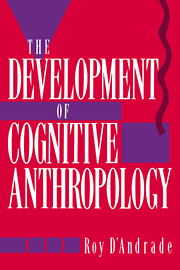Book contents
- Frontmatter
- Contents
- List of figures
- List of tables
- Preface
- 1 Background
- 2 Towards an analysis of meaning
- 3 The classic feature model
- 4 Extension of the feature model
- 5 Folk taxonomies
- 6 The growth of schema theory
- 7 Models and theories
- 8 Cultural representations and psychological processes
- 9 Cognitive processes and personality
- 10 Summing up
- References
- Name index
- General index
9 - Cognitive processes and personality
Published online by Cambridge University Press: 05 June 2012
- Frontmatter
- Contents
- List of figures
- List of tables
- Preface
- 1 Background
- 2 Towards an analysis of meaning
- 3 The classic feature model
- 4 Extension of the feature model
- 5 Folk taxonomies
- 6 The growth of schema theory
- 7 Models and theories
- 8 Cultural representations and psychological processes
- 9 Cognitive processes and personality
- 10 Summing up
- References
- Name index
- General index
Summary
One of the basic undertakings for cognitive anthropology is to work out how representational aspects of culture affect the individual. In the last chapter a sketch of how cultural schemas affect perception, memory, and reasoning was presented. In this chapter, the relation between cultural schemas and the personality will be explored. By personality I mean primarily the emotional and motivational aspects of human behavior. The general argument is that it is through linkages with emotion and motivation that cultural schemas affect human action.
Emotion
In the western folk model of the mind, emotion contrasts sharply with cognition. In the folk model emotions art feelings which have little to do with what one thinks. Feelings include localized physical sensations like hunger and pain, as well as unlocalized sensations like anger and joy. According to the folk model, one can direct one's thoughts but one cannot control one's feelings, which are a natural consequence of events. And feelings can be so strong they prevent clear thinking and lead to irrational action. In the folk model, thought and feeling are often cast as opposing forces.
This view of emotion and thought has changed radically over the past thirty years in both psychology and anthropology. A series of experiments in psychology carried out by Stanley Schacter and Jerome Singer in the early 1960s, now described in almost every introductory psychology textbook, are the canonical reference for this change.
- Type
- Chapter
- Information
- The Development of Cognitive Anthropology , pp. 218 - 243Publisher: Cambridge University PressPrint publication year: 1995



